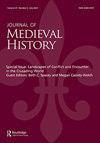与死者对话是一种自我技术:康沃尔的彼得《启示录》中关于从另一个世界回归的协议
IF 0.3
2区 历史学
0 MEDIEVAL & RENAISSANCE STUDIES
引用次数: 0
摘要
摘要本文探讨了1200年左右康沃尔的奥古斯丁教规彼得编纂的《启示录》中朋友之间达成的从死后归来的协议。在履行这些协议的过程中,死去的朋友仍然存在于活着的人虔诚的生活中。他们帮助活着的人改变自己,特别是通过一种epektasis,在这种epektasia中,最初出于对精神世界的好奇和迷恋而渴望看到死者并与之交谈,后来发展成了对上帝更大的崇敬和爱戴。这些协议故事说明,在12世纪的宗教社区背景下,两个人之间的感情——甚至爱——可以被视为参与并导致人与上帝之间的爱。人类情感的这种广泛作用在死后仍在继续,这说明了纪念逝者是一种自我形成的方式。本文章由计算机程序翻译,如有差异,请以英文原文为准。
Converse with the dead as a technology of the self: agreements to return from the other-world in Peter of Cornwall’s Book of Revelations
ABSTRACT This article examines agreements to return from the afterlife made between friends, in the Liber revelationum (Book of Revelations) compiled by the Augustinian canon Peter of Cornwall around 1200. In the fulfilment of these agreements, dead friends remained present in the devotional lives of the living. They helped the living transform themselves, particularly through a type of epektasis, in which what began as a desire to see and speak with the dead out of curiosity and fascination with the spiritual world developed into a greater reverence and affection for God. These agreement stories illustrate how, in the context of twelfth-century religious communities, the affection – and even love – between two people could be seen to participate in and lead toward the love between human and God. This expansive role of human affection continued after death, illustrating some of the ways in which commemoration of the departed was an exercise in self-formation.
求助全文
通过发布文献求助,成功后即可免费获取论文全文。
去求助
来源期刊

JOURNAL OF MEDIEVAL HISTORY
MEDIEVAL & RENAISSANCE STUDIES-
CiteScore
0.60
自引率
0.00%
发文量
29
期刊介绍:
The Journal of Medieval History aims at meeting the need for a major international publication devoted to all aspects of the history of Europe in the Middle Ages. Each issue comprises around four or five articles on European history, including Britain and Ireland, between the fall of Rome and the Renaissance. The Journal also includes review articles, historiographical essays and state of research studies.
 求助内容:
求助内容: 应助结果提醒方式:
应助结果提醒方式:


